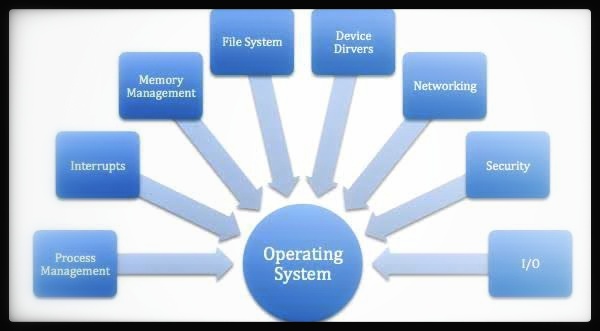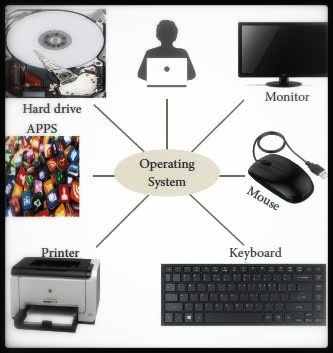Operating System
What Is an Operating System (OS) ?
An Operating System (OS) is an interface between a computer user and computer hardware. An operating system is a software which performs all the basic tasks like file management, memory management, process management, handling input and output, and controlling peripheral devices such as disk drives and printers.
Some popular Operating Systems include Linux Operating System, Windows Operating System, VMS, OS/400, AIX, z/OS, etc.
Definition
Operating system (OS), program that manages a computer’s resources, especially the allocation of those resources among other programs. Typical resources include the central processing unit (CPU), computer memory, file storage, input/output (I/O) devices, and network connections. Management tasks include scheduling resource use to avoid conflicts and interference between programs. Unlike most programs, which complete a task and terminate, an operating system runs indefinitely and terminates only when the computer is turned off..
Following are some of important functions of an operating System.
Memory Management
Processor Management
Device Management
File Management
Security
Control over system performance
Job accounting
Error detecting aids
Coordination between other software and users
ऑपरेटिंग सिस्टम (ओएस) क्या है?
एक ऑपरेटिंग सिस्टम (OS) एक कंप्यूटर उपयोगकर्ता और कंप्यूटर हार्डवेयर के बीच एक इंटरफ़ेस है। एक ऑपरेटिंग सिस्टम एक सॉफ्टवेयर है जो फ़ाइल प्रबंधन, मेमोरी प्रबंधन, प्रक्रिया प्रबंधन, इनपुट और आउटपुट को संभालने और डिस्क ड्राइव और प्रिंटर जैसे परिधीय उपकरणों को नियंत्रित करने जैसे सभी बुनियादी कार्य करता है।
कुछ लोकप्रिय ऑपरेटिंग सिस्टम में लिनक्स ऑपरेटिंग सिस्टम, विंडोज ऑपरेटिंग सिस्टम, VMS, OS/400, AIX, z/OS आदि शामिल हैं।
परिभाषा
ऑपरेटिंग सिस्टम (OS), प्रोग्राम जो कंप्यूटर के संसाधनों का प्रबंधन करता है, विशेष रूप से उन संसाधनों का अन्य कार्यक्रमों के बीच आवंटन। विशिष्ट संसाधनों में सेंट्रल प्रोसेसिंग यूनिट (CPU), कंप्यूटर मेमोरी, फ़ाइल स्टोरेज, इनपुट/आउटपुट (I/O) डिवाइस और नेटवर्क कनेक्शन शामिल हैं। प्रबंधन कार्यों में कार्यक्रमों के बीच टकराव और हस्तक्षेप से बचने के लिए संसाधनों के उपयोग को शेड्यूल करना शामिल है। अधिकांश प्रोग्रामों के विपरीत, जो एक कार्य को पूरा करते हैं और समाप्त हो जाते हैं, एक ऑपरेटिंग सिस्टम अनिश्चित काल तक चलता है और कंप्यूटर बंद होने पर ही समाप्त होता है।
ऑपरेटिंग सिस्टम के कुछ महत्वपूर्ण कार्य निम्नलिखित हैं।
स्मृति प्रबंधन
प्रोसेसर प्रबंधन
डिवाइस प्रबंधन
फ़ाइल प्रबंधन
सुरक्षा
सिस्टम प्रदर्शन पर नियंत्रण
नौकरी लेखांकन
एड्स का पता लगाने में त्रुटि
अन्य सॉफ्टवेयर और उपयोगकर्ताओं के बीच समन्वय













